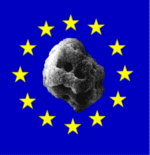

 |
 |
Main |
| Day 0 (Wednesday 19.7.2000) | ||
| - Arrival of participants - Registration, accomodation - Get-together dinner |
||
| Day 1 (Thursday 20.7.2000) | ||
| 07.30 - 08.30 Morning session (Chairman: S. Wale) 08.30 - 08.40 08.40 - 08.55 08.55 - 12.30 (15'+10') 08.55-09.20 09.20-09.45 09.45-10.10 10.10-10.30 10.30-11.00 11.00-11.25 11.25-11.50 11.50-12.10 12.10-12.30 12.30-14.00 Afternoon session (Chairman: Paul Gans) 14.00-15.30 15.30-16.00 16.00-18.30 19.30 |
Breakfast National potato production and powdery scab situation Stuart Wale Welcome address Ueli Merz Introductory talk Presentations by participants Stuart Wale The powdery scab situation in Scottland Steen Lykke Nielsen Potato production and powdery scab situation in Denmark Ueli Merz Potato production and powdery scab situation in Switzerland Didier Andrivon Potato production and powdery scab situation in France Coffee break Jan van de Haar/Wilbert Flier Powdery scab situation in the Netherlands Other European countries and international situation Ueli Merz Overview Dolf de Boer Powdery scab situation in Australia Discussion Lunch Symptom range and recognition, disease assessment, seed testing Presentations and discussion of symptom range and the need for identification methods Coffee break Discussion of disease scoring systems and a possible standard / Discussion of seed certification requirements Dinner |
|
| Day 2 (Friday 21.7.2000) | ||
| 07.30 - 08.30 Morning session (Chairwoman: A. Lees) 08.30 - 12.30 (15'+5') 08.30-08.50 08.50-09.10 09.10-09.30 09.30-09.50 09.50-10.10 10.10-10.30 10.30-11.00 11.00-11.20 11.20-11.40 11.40-12.30 12.30-13.40 Afternoon session (Chairman: U. Merz) 13.40-19.00 (15'+5') 13.40-14.00 14.00-14.20 14.20-14.40 14.40-15.00 15.00-15.30 15.30-16.00 16.00-16.20 16.20-16.40 16.40-17.00 17.00-17.20 17.20-17.40 17.40-18.00 18.00-18.30 19.30 |
Breakfast Present powdery scab control measures: Direct and indirect control (Indirect control incl. resistance, seed certification, crop rotation, avoidance, biocontrol) Presentations by participants Alison Lees Breeding for disease resistance to powdery scab Paul Gans Resistance screening Ueli Merz Powdery scab control in Switzerland Wilbert Flier Resistance screening and cultural practices Kees Bus Chemical control of powdery scab Stuart Wale Powdery scab control in Scottland Coffee break Dolf de Boer Biofumigants Ueli Merz Direct control experiments in New Zealand Discussion Lunch Past and ongoing research on powdery scab and mop top virus Presentations by participants Powdery scab P. van de Graaf Epidemiology and control of Spongospora subterranea var. subterranea Karima Bouchek The detection of S. subterranea f.sp. subterranea by various methods (bioassay tests, molecular and serological methods Ueli Merz Powdery scab. Research in Switzerland Stuart Wale Powdery scab research in Sottland Discussion Coffee break Xinshun Qu The amoebal stage of S. subterranea f.sp. subterranea Xinshun Qu Detection of S. subterranea f.sp. subterranea using molecular markers Xinshun Qu Some phyllogenetical aspects of the Plasmodiophorales Mop Top Virus Angelika Ziegler Studies on localization and funktion of the putative movement proteins of potato mop top virus Steen Lykke Nielsen Past and current Danish research on mop top virus and powdery scab Valérie Helias Evaluation and adaption of diagnostic methods for potato mop top virus Discussion Dinner |
|
| Day 3 (Saturday 22.7.2000) | ||
| 07.30 - 08.30 08.30 - 09.00 Morning session (Chairman: W. Flier) 09.00-10.30 10.30-11.00 11.00-12.30 12.30-13.30 Afternoon session (Chairman: Didier Andrivon) 13.30-15.00 15.00 |
Breakfast Clearing of rooms Recognizing important components of an integrated control approach incl. new, rapid and cost-effectiv tools and methodologies (e.g. resistance, biocontrol, crop management, forecasting) and urgent research needs Plenary discussion Coffee break Plenary discussion Lunch Possibilities for collaborative research / An EU proposal Plenary discussion and conclusions End of workshop | |
 Up / Main
Up / Main